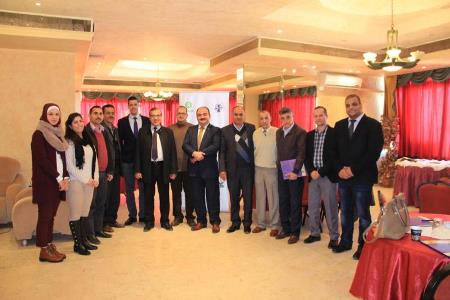|
MIFTAH caps off three-day training for Ministry of Health budget team
As part of its OXFAM-funded “Finance for Development” project, MIFTAH completed three days of training entitled “Analysis of the public budget, participatory budgeting and the citizens’ budget” for the Ministry of Health’s budget preparation team in Nablus. The training, designed and carried out by Mr. Mo’ayad Afaneh- an expert in standards of international transparency for public budgets, included several topics with a focus on the concept of the state’s public budget. This included the conceptual, economic, social, legal and legislative framework for regulating the public budget (budget law), the types of budgets (items and programs) and the provisions of the main public budget – that is, the budgetary structure and reports, in addition to two practical training sessions. The first was on the cycle of budget preparation: preparation, supervision and monitoring, as well as on international standards for public budget transparency. The second training was on the concept of the citizens’ budget, its components, advantages and methodology in addition to the steps forward of the citizens’ budget team at the Ministry of Health [MoH]. Participant feedback Several participants expressed their appreciation for the outcome, skills and capacity building acquired at MIFTAH’s training, saying they felt this was a “quantum leap” for them. Dr. Jawad Bitar, director of the health information center at the MoH said the training course opened up new horizons for the participants because they were introduced to methods for devising the different types of budgets, most importantly the participatory and citizens’ budgets. These, he said, were new concepts for the participants and that the training helped them gain new information and skills. Bitar stressed on the importance of cooperation between the public sector and civil society institutions. “This cooperation is crucial, especially since there are parties such as MIFTAH with experience that can be invested in and benefited from.” Project coordinator for the public administration of planning and health policies at the Ministry Zuhur Mansour, said the training was “qualitative and interactive” and that it provided participants with many new ideas and concepts, such as the definition of budgets and their types and provisions. “It’s true that we do our jobs from day to day, but we are not well versed in the terms and concepts we learned at the workshop,” she admits. “This has helped us develop our terms and enrich our experience. It also introduced us to certain budgetary laws, including involving citizens in budget preparation; we now realize the necessity of publishing the budget so that the average citizen can have access to it. We hope there will be complementary training courses that other ministry departments can participate in.” Meanwhile, Samer Jabr, director of the health economics department and coordinator of the MoH citizens’ budget team said they were keen on opening up to citizens and facilitating access to data that would clarify the role of the ministry in terms of its significance in society. He said the training offered tools to the ministry on how to draft their citizens’ budget, which gives a clearer picture of the role of the MoH to citizens. He also said the training aimed at capacity building for the ministry’s teams, raising awareness on the citizens’ budget and on the government’s policy approach in general. “After these three days of training, we will surely be able to prepare our 2018 Citizens’ Budget in cooperation with MIFTAH,” Jabr said. MIFTAH project coordinator for “Finance for Development” Tamara Tamimi said the training was the first step in a number of joint interventions with the MoH aimed at promoting transparency of the public budget as a prerequisite for influencing financial policies geared towards social justice. Tamimi added that the joint interventions with the MoH come after MIFTAH’s successful experience with the Ministry of Social Development, first in the publication of their 2016 and 2017 Citizens’ Budgets and second, with the Ministry of Education and Higher Education in publishing their 2017 Citizens’ Budget, which adopted clear standards of international transparency for budgets.

http://www.miftah.org |